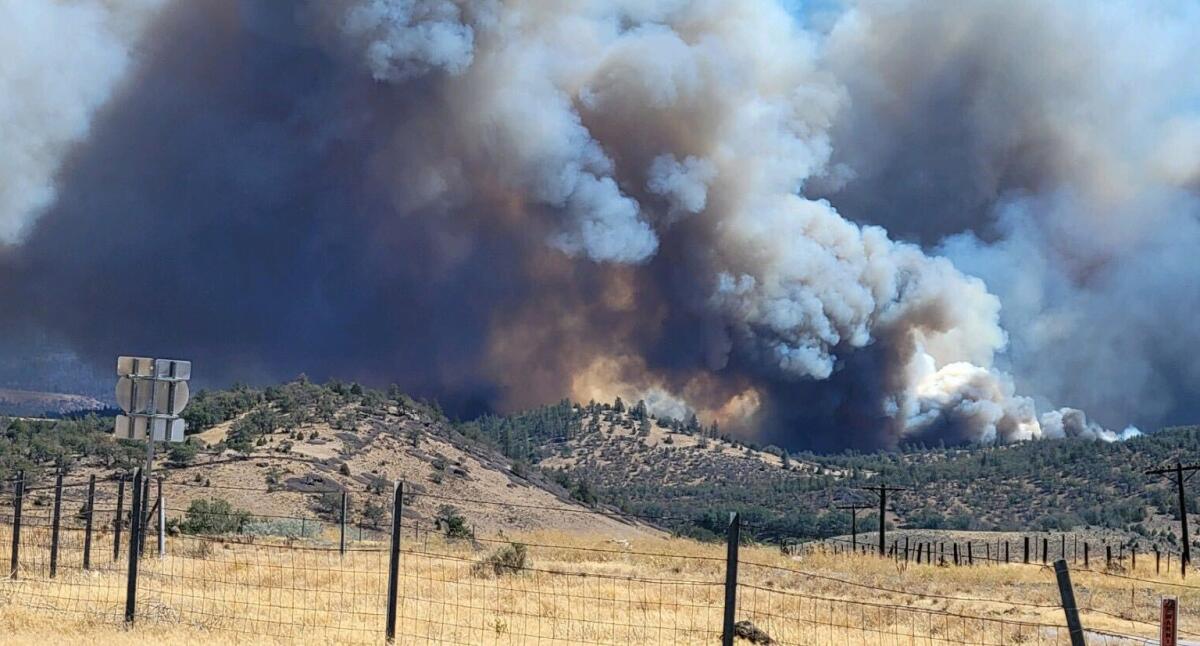Lumber mill operator sparked deadly Northern California fire, authorities say

- Share via
The wildfire that tore through a Northern California town last year, killing two and destroying scores of homes, was caused by a lumber mill in the area, fire officials said.
Investigators with the California Department of Forestry and Fire Protection determined the blaze was caused by operations at the Roseburg Forest Products property in Weed, a small city in Siskiyou County.
“Roseburg’s priority is to support our neighbors as they rebuild their homes and the Weed and Lake Shastina communities,” said Pete Hillan, a spokesperson for the company. “Today’s CalFire report does not change that. We cooperated fully with the investigation and will thoroughly review the report once we have received it.”
The Mill fire ignited Sept. 2 and quickly spread to the communities of Lincoln Heights and Lake Shastina, resulting in the deaths of two elderly women. Cal Fire officials said the fire burned 3,935 acres and destroyed 144 structures including many homes. At least three people were injured in the fire.
Cal Fire officials said little else about their findings, referring all inquiries to the Siskiyou County district attorney’s office. The report, released Friday, reaffirms suspicions by residents who believe the fire spread from a building on the lumber mill property to nearby homes.
Just days after the fire ignited, the operator of the lumber mill was investigating whether hot ash stored on its property had started the wildfire. The ash is supposed to be sprayed with cooling water after it is ejected by the generator, but it is possible that a water-spraying machine failed, the company said in a news statement at the time. The machine, it said, was supplied by a third-party equipment manufacturer.
At the time, Hillan told The Times that two buildings on the mill’s campus had burned: the planer building — a large warehouse used to store spare parts — and Shed 17 — a smaller bunker where the ash was stored.
Hillan said Shed 17, which shared a wall with the planer building, was made of cement but was housed in an old wooden frame. There was less than half a truckload of ash inside the bunker at the time the fire started, he added.
James Frantz, whose law firm is representing 30 families affected by the fire, filed a lawsuit last year alleging that the company failed to properly handle the hot ash and was aware that the area was susceptible to fires. He said records show multiple fires had broken out at the property as far back as 10 years ago.
“The bottom line is that they have a business and they have to make sure that it’s not going to harm people and that it’s fire-safe,” Frantz said. “I think they consciously disregarded people’s safety.”
The company has said it is aware of the allegations.
Frantz said that his firm and the company have been negotiating over a settlement but that he is prepared to take some of the cases to court.
In December, facing other lawsuits, Roseburg Forest Products agreed in principle with four law firms representing a majority of claims to settle the families’ property losses, personal injuries and wrongful death claims arising from the fire.
In a statement released that month, the company said the four law firms — Reiner Slaughter Mainzer & Frankel; Parkinson Benson Potter; Singleton Schreiber; and Cotchett, Pitre & McCarthy — represent more than 700 individuals affected by the Mill fire. The status of those settlements was not known as of Friday.
The settlements were in addition to a $50-million fund made available the month the fire broke out. The fund was to provide assistance for needs such as temporary housing, transportation, food and medical issues.
Hillan said at the time that company officials had seen how long it takes for residents to get financial help after other fires and wanted to do something to help the community where Roseburg has been a substantial employer for 40 years.
Times staff writer Alex Wigglesworth contributed to this report.
More to Read
Sign up for Essential California
The most important California stories and recommendations in your inbox every morning.
You may occasionally receive promotional content from the Los Angeles Times.














